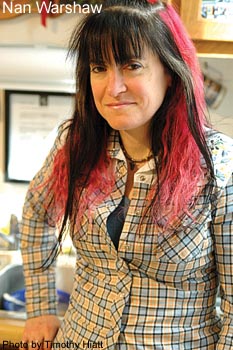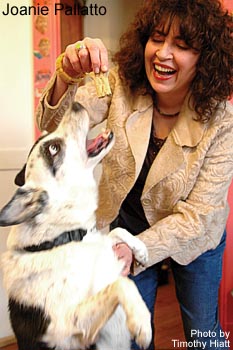Local Indie Label Special
It’s A Woman’s Woman’s Woman’s Woman’s (& Man’s) World
Bloodshot’s Nan Warshaw and Southport’s Joanie Pallatto might not agree on every talmudic aspect of running an independent record label, though neither would say being female has made any difference.
“There’s certainly more guys out there in music in general than women, but it’s never been an issue for me. I’ve never felt any sense of discrimination,” Warshaw says. “The Chicago indie music scene is incredibly egalitarian and open-minded . . . so given that, the scene here is very holistic and has a lot of camaraderie. So . . . that helps prevent the negative things, the stereotypes or biases that you often see in the rest of the business world because the indie music scene here is not set up because of the business, it’s set up because of art.”

As a woman at the helm, Warshaw shrugs off any notion of breaking through a glass ceiling, at least in Chicago. Hell, she even possessed the freedom to bring her son to work everyday during his first year, allowing her to breast feed. Her nanny doubled as an intern when the baby (now 6-years old) napped in Warshaw’s office.
For Joanie Pallatto, co-owner of Southport Records, the old boys’ club adage applies more in the studio setting than sitting behind the proverbial desk at the classical and jazz label.
The Xenia, Ohio native met pianist/composer Bradley Parker-Sparrow after moving to Chicago to pursue a singing career in 1980. The two teamed up both professionally under the umbrella of Sparrow Sound Design, which encompassed Sparrow’s Lincoln Park recording studio and record label, and romantically. Southport Records became the label’s moniker after the studio relocated to Lakeview.
“I think I’m kind of at an unfair advantage because I have a partner who is my husband, who is a man, admittedly,” Pallatto says as Sparrow exits the kitchen with the couple’s rowdy dog, Magic. “I hope we’ve been looked at as a whole entity as a couple running a label together. We both have our strengths and we recognize them and our weaknesses.”
But for any wide-eyed, recent college graduates with designs of starting a record label, Warshaw has one word of advice: Don’t. At least that’s the wisdom the Bloodshot Records co-founder wishes to impart on those still harboring any romantic notions about the music industry.
“It would be much harder to do today than when we started and it wasn’t easy then,” the fuchsia-pig-tailed 45-year-old says. “So many artists today don’t even think that they need labels.”
Back in 1994, Warshaw, Rob Miller and Eric Babcock (who has since departed the operation) didn’t intend to create an indie label; the three music fans merely wanted to document a slice of the scene. “We were enthusiastic about a number of local bands who were playing around Chicago in the rock clubs and we saw a theme to them,” Warshaw says from Bloodshot’s tiny headquarters on the city’s North side. “A thread of old school country running through their music.”
For A Life Of Sin: A Compilation Of Insurgent Chicago Country followed, featuring the likes of Welsh-born rabble rouser Jon Langford, Robbie Fulks, and The Handsome Family. When the record broke even, the response was a hearty, let’s do it again. Now, more than a decade later, the label employs a full-time staff of seven and boasts a roster including Justin Townes Earle, Jon Rauhouse, Waco Brothers, Graham Parker, Firewater, and Kelly Hogan, who served as the label’s first publicist and only paid staff member.
Crafting an image around the compilation ranked high on the list of priorities, hence why Hogan regularly received a check three years before Warshaw or Miller ever collected a salary. Even though the original intention wasn’t to morph into a full-service label, Warshaw admits they pretended that was the end goal and put in place a plan to secure distribution and press attention, which, looking back, might have been too successful.
“We’re still under that whole straitjacket that we created of this insurgent country image when we’ve continued to broaden the scope of what we do,” Warshaw explains. “We’ve always thought of ourselves as an indie rock label with roots inflections and as time has gone on and we’ve become more established that’s allowed us to diversify. I mean, it’s the same road, it’s just we’re adding more lanes.”
One avenue Warshaw didn’t expect to take after graduating from Columbia College with a masters in Arts, Entertainment And Media Management was the one marked boss — a title guaranteeing mounds of paperwork. Warshaw jokes that writing her thesis on independent booking of alternative rock drove her away from a career as a booking agent and had she researched running an indie record label, the same conclusion might have ensued.
“I mean, it is pretty thankless and the payback is seeing a band succeed. It’s being at a show where there’s just moments of brilliance in the performance or where some element of the performance sends chills down your spine. Those sort of things are the payback, because the artists rarely thank you. You usually hear about it when things are going wrong, not when things are going right,” Warshaw admits. “So, 98 percent of it is grunt work, two percent of it might be glamorous . . . but even that grunt work, I would rather be doing that because I know I might be making a difference in these artists’ careers.”

With conservatory training from the University Of Cincinnati under her belt, Pallatto decided to glean a second, hands-on education with Sparrow behind the console. “I said . . . ‘I might as well breathe down his neck and learn something,'” Pallatto remembers. “Growing up in my era, Dad wouldn’t even let me hold a paint brush to help paint the fence. So there wasn’t gonna be a guy or Dad around to say, ‘Here’s how you connect two speakers to set up your stereo system.'”
Pallatto likens producing to “mothering the session along” and in the studio feels like the “luckiest girl in the world” just to work within the realm of music, but readily admits that running Southport Records is a constant challenge. For this reason, Sparrow and Pallatto shucked the stand-alone studio and catering to outside clients and converted their home into a studio for Southport artists such as Bobby Lewis, Willie Pickens, and George Flynn instead.
“We did it a lot of years and sort of felt like it was time to make a change and continue the label work, not record as many clients outside of the label as we had been churning . . . and focus on our own music finally again, frankly,” Pallatto explains. “Some people say, ‘You have a home studio now.’ No, we have a studio home.”
Pallatto’s own It’s Not Easy marks the first release recorded in this new configuration, which finds the couple’s dining room doubling as a control room and Pallatto’s walk-in closet doubling as a vocal booth.
The album also marks Pallatto’s first foray into recording her own original material instead of relying on standards and Sparrow’s compositions. In fact, she received quite a bit of lyrical help from daily telephone conversations and visits with her 94-year-old mother.
“Creating this whole recording really did start with my mother and it started with having the time to go see her [in Ohio] anytime I want and not have to worry about what the studio schedule was,” Pallatto says.
With Southport Records taking center stage, Pallatto and Sparrow can better ensure their artists “realize their dream[s],” despite a slew of Myspace-generation musicians determined to eschew the label system.
“Independent labels are very important to their artists . . . it would behoove them to be connected with a label,” Pallatto reasons. “A lot of artists don’t have the vision to promote themselves. And I think that’s what it all boils down to.”
Don’t say they didn’t warn you.
— Janine Schaults









